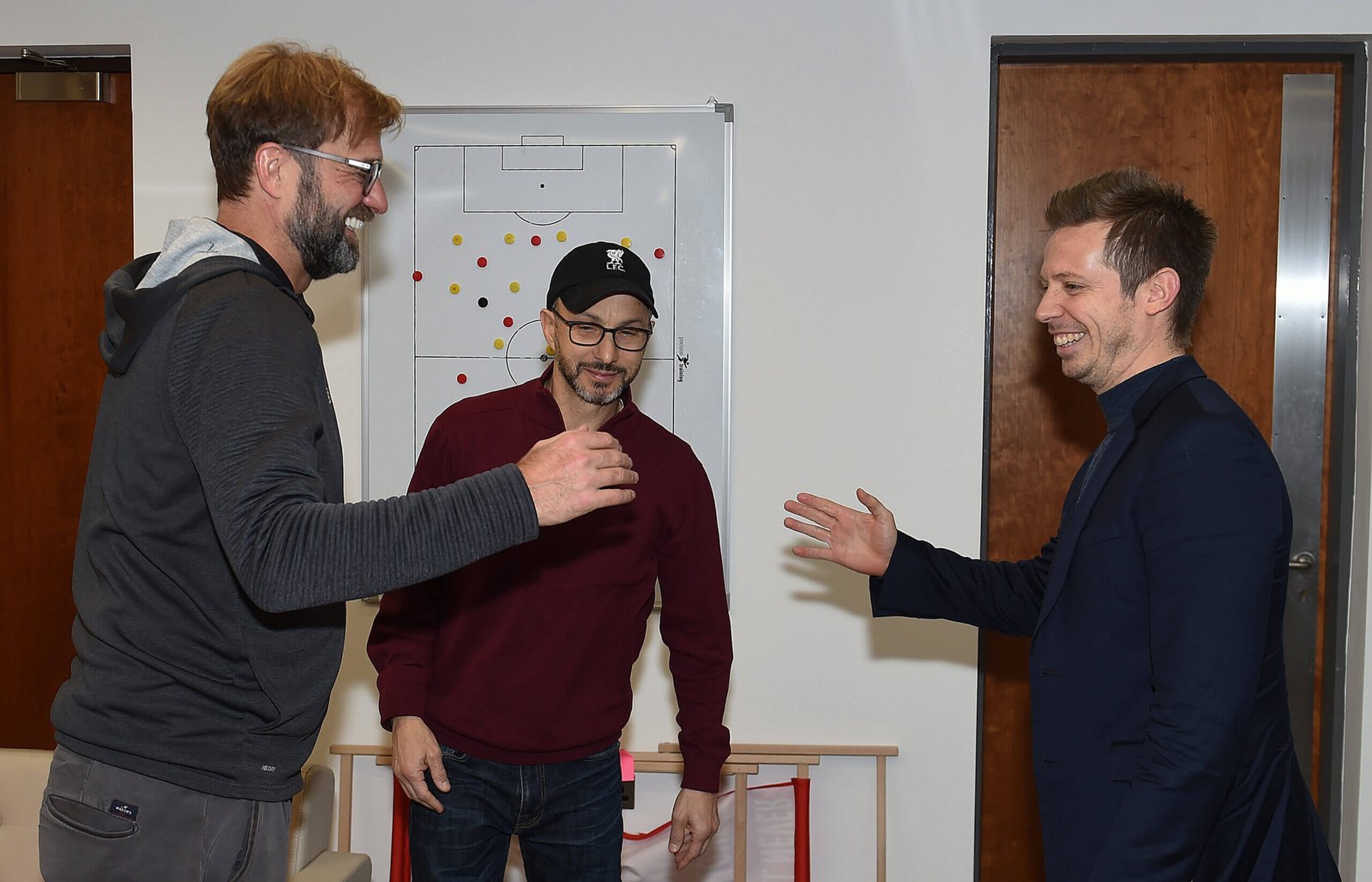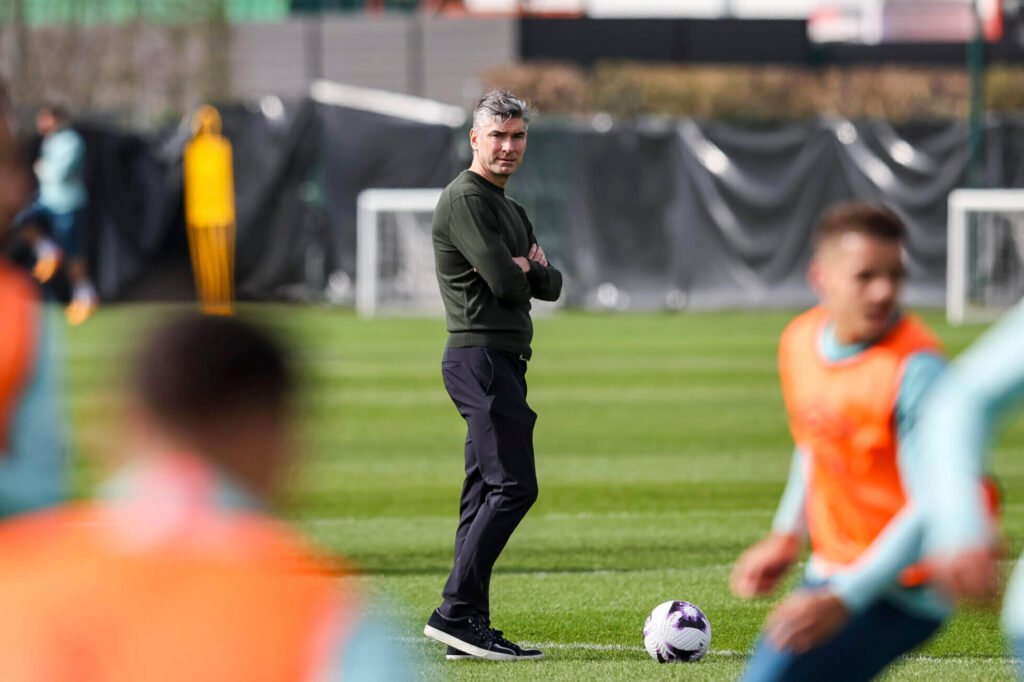Twenty years after playing his part in ending an era at Liverpool, Richard Hughes has been tasked with launching a new one.
It was February 2004 when the Scottish midfielder left Gerard Houllier red-faced by scoring the winner for Portsmouth in a FA Cup fifth round replay at Fratton Park. Three months later the Frenchman’s Anfield reign was over.
Now Hughes finds himself entrusted with guiding Liverpool in the aftermath of Jurgen Klopp’s exit after being confirmed as the club’s new sporting director.
The 44-year-old was headhunted by Michael Edwards, who was appointed as Fenway Sports Group’s new CEO of football last week. Hughes will officially start on June 1 as he is currently serving his notice period at Bournemouth but with so much to be addressed, it is unthinkable that work will not be going on behind the scenes long before then.
“I am incredibly proud to be offered this opportunity,” Hughes said. “People rightly talk about the rich history this organisation can boast, but it is the present and future which really excites me.”
Richard Hughes scores the winner against Liverpool for Portsmouth (Gareth Fuller – PA Images/PA Images via Getty Images)
His in-tray is bulging. The obvious priority is identifying and recruiting Klopp’s successor. Having analysed an array of data on potential candidates, Liverpool’s owners always wanted the new executive structure established before the pursuit of a manager was cranked up and that’s now in place.
Xabi Alonso is widely admired and remains the outstanding candidate given the job he has done at Bayer Leverkusen, who are 10 points clear at the top of the Bundesliga. The former Liverpool midfielder is also being pursued by Bayern Munich. Hughes has a good relationship with Alonso’s agent Inaki Ibanez, who also represents Bournemouth head coach Andoni Iraola.
With coaches Pep Lijnders, Peter Krawietz and Vitor Matos among the backroom staff members who are leaving Liverpool when Klopp departs, there are a lot of gaps to fill.
Then there’s the issue of resolving the contract situations of Mohamed Salah, Virgil van Dijk and Trent Alexander-Arnold, who will all be down to their final year this summer. If negotiations drag on, the risk of anyone leaving for free in 2025 will grow.
Will Salah have his head turned by renewed interest from Saudi Arabia? Will Liverpool receive an offer which is simply too good to turn down?
Currently, there is nothing to suggest that Salah is looking to move on. The Egyptian turns 32 in June but he recently became the first Liverpool player in history to score 20 goals or more in seven successive seasons and remains the club’s most potent attacking weapon.
Van Dijk will be 33 in July but the club captain has been in exceptional form this season and believes he can continue to perform at the highest level into his late 30s. No manager would want to lose someone as technically gifted as Alexander-Arnold, who has long since been earmarked as a future skipper.
There isn’t a major squad rebuild for Hughes to oversee but with Joel Matip, Thiago and Adrian out of contract in the summer there is certainly business to be done.
Glasgow-born Hughes, who is a Celtic fan and speaks fluent Italian, has to try to make FSG’s self-sustaining business model work in the same way as Edwards did during his successful spell as sporting director between 2016 and 2022. That means trying to find value and untapped potential on signings, and negotiating hard to maximise the return for outgoings.
The pressure, scrutiny and expectation – as well as the budget – will be a world away from life on the south coast at Bournemouth where Hughes has served as technical director since 2016.
But Edwards is convinced that he is ready to make the sizeable step up. There is a bond between them which spans over 20 years going back to their days together at Portsmouth where Hughes was a player and Edwards was an analyst.

From left: Jurgen Klopp, FSG president Mike Gordon and Michael Edwards in 2019 (John Powell/Liverpool FC via Getty Images)
Hughes was part of a group of senior players, including Eddie Howe (now manager of Newcastle United) and Gary O’Neil (now manager of Wolves), who were frequent visitors to the analysts’ room as they requested data and video clips to study.
Impressed by how Hughes articulated his views on different styles and formations, as well as players’ strengths and weaknesses, Edwards always assumed that he would go down the coaching route when he retired from playing.
However, Howe, who was manager of Bournemouth when Hughes retired in 2014, convinced him to join the club’s recruitment staff and he was elevated to the role of technical director two years later.
Edwards believes Hughes was integral to Bournemouth punching well above their weight in the years that followed as they finished ninth, 12th and 14th in the top flight. Relegated to the Championship in 2020, they returned to the Premier League two years later and are comfortably clear of the relegation battle this season.
Shrewd recruitment decisions were key as Bournemouth identified and attracted young talents such as Tyrone Mings, Lewis Cook, David Brooks, Lloyd Kelly and Philip Billing. Liverpool themselves had looked extensively at Brooks and Kelly.
Edwards’ respect for him was also enhanced by knowledge of the deals that he couldn’t pull off because of rivals with deeper pockets and greater pulling power. For example, Liverpool beat Bournemouth to the signature of Joe Gomez when he left Charlton Athletic. It was a similar story with Andy Robertson in 2017 and Harvey Elliott in 2019. Circumstances may have worked against him, but the identification process was highly effective.
Liverpool beat Bournemouth to Joe Gomez’s signing (Chris Hyde/Getty Images)
Hughes grew up in Milan and Edwards tapped into his knowledge of Italian football prior to Liverpool signing Salah and Alisson from Roma.
The pair did business when Dominic Solanke was sold by Liverpool to Bournemouth for a fee rising to £24million in 2019. That deal certainly proved to be more beneficial for Bournemouth than the combined outlay of £21m for Anfield fringe players Jordon Ibe and Brad Smith in 2016.
When Julian Ward stepped down as Liverpool’s sporting director last May after just one season at the helm, Edwards was surprised that both Hughes and current Crystal Palace sporting director Dougie Freedman were not interviewed by FSG. The owners ultimately opted for a stop-gap solution in German executive Jorg Schmadtke, who left Liverpool at the end of the January transfer window.
During his work over the course of this season as an advisor for the consultancy firm Ludonautics, which was set up by Liverpool’s former director of research Ian Graham, Edwards told a number of leading European clubs that Hughes should be on their radar.
Once his own return as FSG’s CEO of football was agreed earlier this month, it was a formality that Hughes’ appointment would follow soon after. Working together has been a long-standing wish for both of them.
With Hughes calm and measured, and Edwards more combative, they are very different personalities but the owners are convinced they will complement each other as they share the same vision for Liverpool’s future.
They will need to, as the challenge facing Hughes in ensuring the club continues to flourish after Klopp waves goodbye is considerable.
(Top photo: Robin Jones, AFC Bournemouth via Getty Images)
Read the full article here

